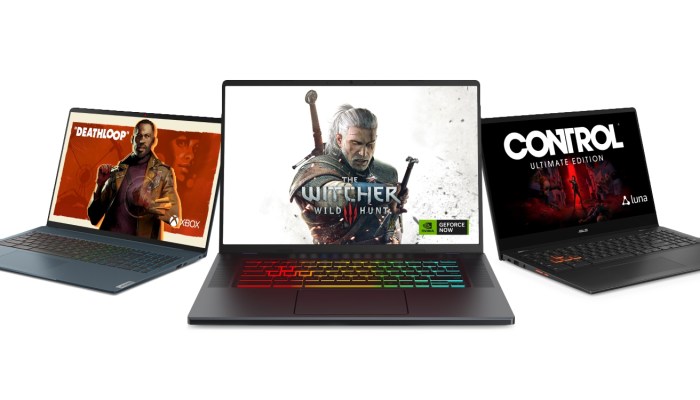It’s been barely a few weeks since Google announced that it is shutting down its cloud gaming service Stadia next year. And now, the company has a new cloud gaming announcement: It is launching Chromebooks tuned for cloud gaming made by different manufacturers.
The search giant has also partnered with cloud gaming services like Nvidia GeForce Now, Microsoft Xbox Cloud Gaming and Amazon Luna to bring marquee titles to users. What’s more, the company has teamed up with accessory makers such as Acer, Corsair, HyperX, Lenovo and SteelSeries to make “Works with Chromebook” certified peripherals for these devices.
Hardware
This first set of Chromebooks for cloud gaming made by Acer, Asus and Lenovo have many gaming-related features. These include high-resolution displays with refresh rates of 120Hz and above, Wi-Fi 6 or 6E compatibility, high-quality audio and RGB keyboards with anti-ghosting (a feature that registers all the key presses accurately even when you press multiple keys at once).
To make these gaming Chromebooks appeal to a wider audience the first set of devices is priced between $399 and $799. Depending on the pricing, these laptops use Intel’s processor, from Core i3 to Core i7. Here’s a quick rundown of the specifications of the three launch models.
Lenovo IdeaPad Gaming Chromebook
- Display: 16-inch WQXGA screen (2560 x 1500) with 120Hz refresh rate
- Processor: 12th Gen Intel Core i3/i5
- RAM: 8GB RAM
- Storage: 256GB/512GB SSD; 128GB eMMC
- Audio: 4 x 2W speakers with Waves Audio
- Connectivity: 2×2 Intel Wi-Fi 6E; Bluetooth 5
- Ports: 2 x USB 3.2 gen 2 type C; 1 x USB 3.2 gen 1 type A; 1 x HDMI 2.0; 1x audio combo jack; 1 x microSD card reader
- Battery: 71 Wh
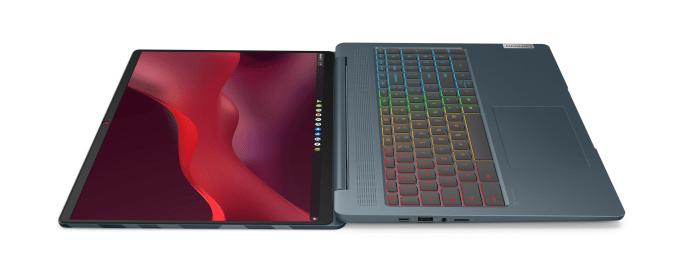
Image Credits: Lenovo
Acer Chromebook 516 GE
- Display: 16-inch WQXGA screen (2560 x 1500) with 120Hz refresh rate
- Processor: 12th Gen Intel Core /i5
- RAM: 8GB RAM
- Storage: 256GB SSD
- Audio: DTS audio; quad force vibration cancellation stereo
- Connectivity: 2×2 Intel Wi-Fi 6E; Bluetooth 5.2
- Ports: 2 x USB 3.2 gen 2type C; 1 x USB 3.2 gen 2 type A; 1 x HDMI 2.1; 1x audio combo jack; 1 x Ethernet RJ-45 port
- Battery: 65 Wh
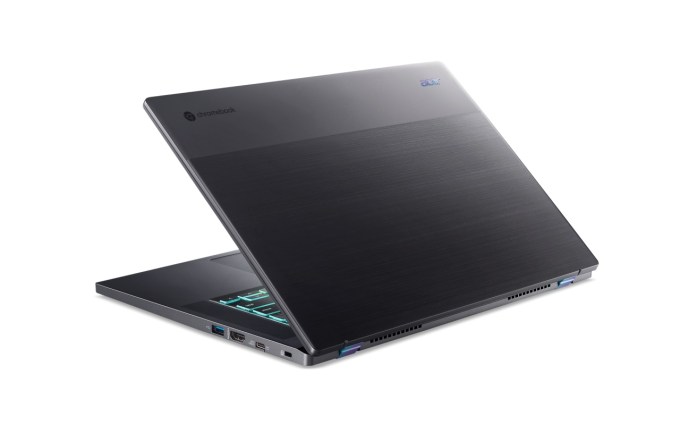
Image Credits: Acer
Asus Chromebook Vibe CX55 Flip
- Display: 15.6-inch FullHD (1920 x 1080) IPS touchscreen with 144Hz refresh rate
- Processor: 11th Gen Intel Core i3/i5/i7
- RAM: 8GB/16GB RAM
- Storage: 128GB/256GB/512GB SSD
- Audio: 2x Harman/Kardon certified speakers
- Connectivity: 2×2 Wi-Fi 6; Bluetooth 5
- Ports: 2 x USB 3.2 gen 2 type C; 1 x USB 3.2 gen 1 type A; 1 x HDMI 2.0; 1x audio combo jack; 1 x microSD card reader
- Battery: 57 Wh
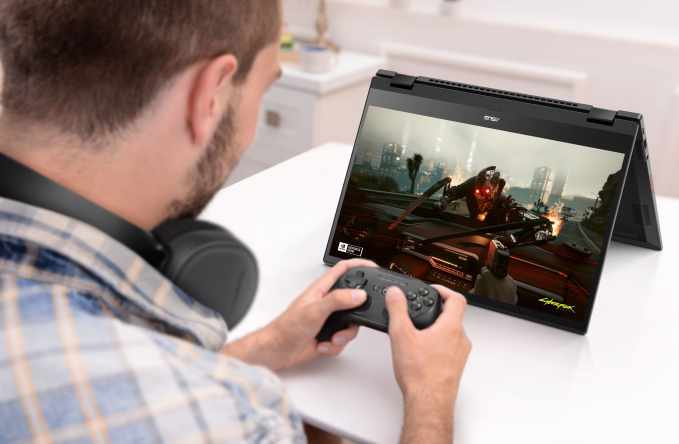
Image Credits: Asus
At the moment, Google doesn’t have a set of requirements or certification for Chromebooks for cloud gaming. So we don’t know if future devices have to meet certain specifications to be included in this program, but Google will push on future devices having high refresh rate screens and good Wi-Fi connectivity at a minimum.
However, the company said all three launch devices have been independently tested by GameBench to ensure they have a consistent and smooth gaming experience at 120 frames per second with a latency of less than 85ms. All these devices will go on sale sometime in October.
The supported accessories made by Acer, Corsair, HyperX, Lenovo and SteelSeries include headsets, mice and controllers.
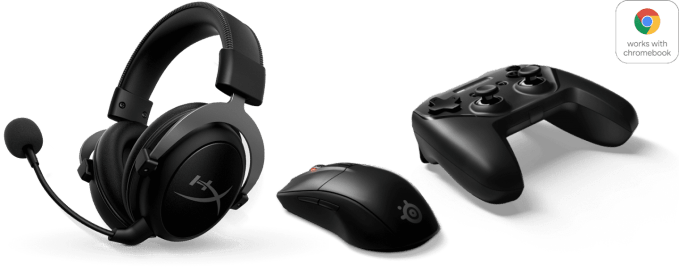
Image Credits: Google
Gaming and software
To bring cloud games to these three launch devices, Google has partnered with Microsoft, Nvidia and Amazon to support their cloud gaming services Xbox Cloud Gaming, GeForce Now and Luna at the highest quality. During the briefing, the company mentioned that they would have loved to have Stadia on the list (sad reacts only).
On these gaming Chromebooks, you can run GeForce Now’s highest performance tier RTX 3080, which supports resolutions up to 1600p, frame rates up to 120 frames per second and features like ray tracing for a rich visual experience. The GeForce Now will be preinstalled on the launch devices and buyers will get a three-month RTX 3080 subscription for free.
This subscription allows access to games like Cyberpunk 2077 and Control with free-to-play games like Fortnite, Genshin Impact and League of Legends.
Xbox Cloud Gaming will work on these devices through an installable web app. This brings titles like Forza Horizon 5, Deathloop, Flight Simulator and Gears 5 — accessible via the Xbox Game Pass subscription.
U.S.-based buyers will also get a three-month subscription to Amazon’s Luna gaming service, which includes titles like Devil May Cry 5, Resident Evil 2 and 3 and Sonic Mania.
The Chrome OS team is also introducing a new feature for these new Chromebooks that will let users find GeForce Now and Google Play titles directly from the search bar that’s accessible via the everything button on the bottom-left corner. The company aims to add more services to the search feature in the future. These laptops also have a feature that lets you quickly jump to Slack to answer an important message and pin a cloud gaming service to the taskbar for quick access.
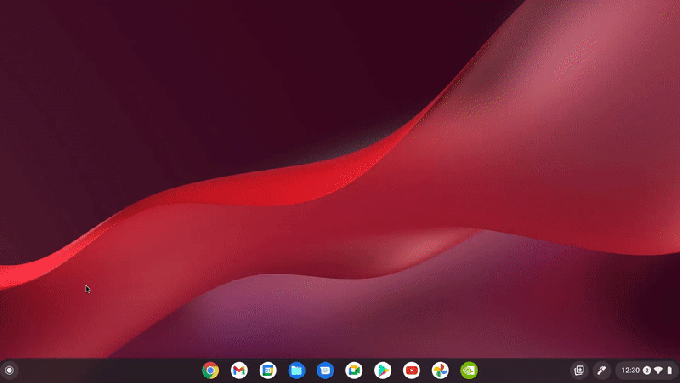
Image Credits: Google
It also specified that, at the moment, this game search feature is limited to gaming Chromebooks but isn’t ruling out bringing them to non-gaming Chromebooks. So we’ll have to just wait and watch.
The road ahead
In its briefing, executives from Google and its partner organizations for the program often harped about the fact that these machines can be handy for causal gamers — people who might not invest time and money into buying a console or building a gaming rig. The company said these machines are for people who can spare a few minutes to a few hours a day for gaming while also being useful as daily work machines.
Google also acknowledges the fact that Chromebooks have been largely known as affordable machines for work and education — and not really built for gaming. It has tried to bring some kind of gaming experience to all Chromebooks with support for platforms like Steam and testing keyboard controls for Android games. But it’s nowhere close to a console or a gaming rig experience.
“As we launch the first Chromebooks designed for cloud gaming, we understand that today, Chromebooks are not necessarily known for being gaming laptops. A lot of people know our devices best for productivity (work, school, documents, presentations and spreadsheets) or online streaming (movies, television and music videos),” John Maletis, VP of Chrome OS Product, Engineering and UX said in a statement.
Given this launch was announced days after the Stadia shutdown, many people will rightly question the program’s potential cognitively. It’s apparent that Google loves being a platform for others to build on. In this program, Google just has the role of being a distributor of Chrome OS. Laptop manufacturers are building the hardware, third-party cloud services are bringing the games and accessory makers are making the peripherals.
The idea of a work-and-play hybrid machine is appealing. For laptop makers, it’s reaching a casual gamer audience with comparatively cheaper machines from gaming laptops; for gaming services, it’s about reaching more screens; and for Google, it’s providing a platform for gaming to foster. There’s a growing interest in making cloud gaming-focused hardware. Microsoft promised to make something last year and Logitech released a cloud gaming handheld last month. So Google wants to make its presence felt in some way.
But the whole ecosystem of manufacturers, cloud gaming providers and Chrome OS features need to have a consistent experience to attract customers. Given that it’s driven by Google, it’s hard to be very confident about the program’s shelf life.
